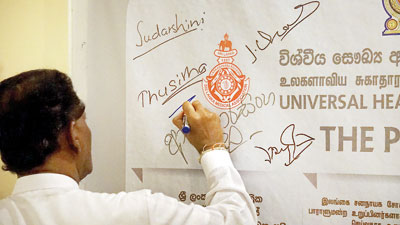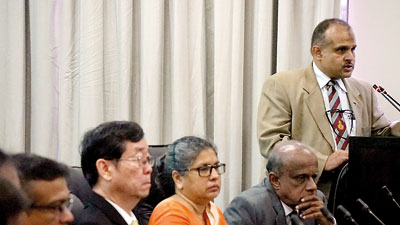News
MPs given a dose of health inequities in Sri Lanka
Lively and interactive was the session, with the role usually played by politicians being reversed on Wednesday.

Parliamentarians signing the Pledge for Universal Health Coverage (UHC) . Pix by William Boyes of the WHO Sri Lanka Office
Usually, while the representatives of the people take to the podium and everyone else listens, that day parliamentarians gave ear intently as a group of eminent professionals, through persuasive arguments supported by solid facts and figures, showed them in which direction Sri Lanka should be headed with regard to the health of its people.
More than 50 Members of Parliament (MPs) signed the pledge at the conclusion of the session ‘Health for All in Sri Lanka: Role of Parliamentarians in achieving Universal Health Coverage (UHC)’ organized by the Sri Lanka Medical Association (SLMA), held in Committee Room 1 of the parliamentary complex at Sri Jayewardenepura, Kotte.
With Speaker of Parliament Karu Jayasuriya presiding, SLMA President Dr. Ruvaiz Haniffa pointed out that different people in Sri Lanka have different health needs but many people are currently missing out on health coverage.
Some of the disturbing data he brought forth, compiled from various studies over a six-year period include:
- 15% of those below five years of age suffer from acute malnutrition. 20% in the same age-group are underweight
- 19% of the population will be in the elderly group by 2030
- 21% of diagnosed diabetics are not on treatment
- 30% of adults have not been screened for hypertension (high blood pressure) and 21% of hypertensives are not on treatment
- Among adults, 25% men and 34% women are overweight
- Household health spending is Rs. 1,488/- per month. In 1.1% of households, there is “catastrophic expenditures of 25% of the total expenditure” per month on health
Commending Sri Lanka’s remarkable achievements in health over the years, with most of the health indicators being on par with developed countries, Dr. Haniffa said that on average, people had access to a primary care centre within 4km. Every man, woman and child visited a primary care physician in the state and/or private sector 5.2 times per year.

SLMA President Dr. Ruvaiz Haniffa addressing parliamentarians. In the picture are some of the other members of the panel
However, he stressed that UHC is about ensuring that all the people get quality health services, where and when they need them, without suffering financial hardship. This is where parliamentarian had an “apex role” to play by giving political leadership, legislative leadership and oversight leadership in “a people-centred system” as opposed to “a doctor-centred manner”.
Echoing similar views, Dr. Palitha Abeykoon sought the support of the MPs to further advance UHC. “Since people should be at the ‘heart’ of the healthcare system, champion the cause of ‘people-centred healthcare’,” he said, quoting the Director-General of the World Health Organization (WHO), Dr. Tedros Adhanom Ghebreyesus who reiterates that “health is a human right. No one should get sick or die just because they are poor or because they cannot access the services they need”.
Dr. Abeykoon underlined what UHC is, stating that according to the WHO it is the single most powerful concept that public health has to offer.
He picked out the three dimensions of UHC which should be looked at and implemented, after taking the current health coverage into account. These dimensions are – increasing population coverage; including more services; and reducing out-of-pocket costs.
It is Dr. Ravi P. Rannan-Eliya who turned a sharp spotlight on the “challenge” of financing healthcare in Sri Lanka.
Asking how Sri Lanka has got such good health outcomes, he answered that a large part of the explanation is that “we use doctors as much as in the rich countries”.
Then came the more crucial information – “but we spend less on health than other countries, largely because government spends less”.
So, how does Sri Lanka manage to achieve so much with such little government spending? One reason is that it has the world’s most efficient government health delivery system, an efficiency that has been confirmed by institutions such as the World Bank, the International Monetary Fund, Harvard University and the Economist Intelligence Unit. The second reason is its “highly unusual mixed system” where the poor use government services the most and the better-off opt for private care.
To the ‘Why?’ he says with a smile – the ballot box. “Most Sri Lankans want easy access, right to free care and equal treatment in the public sector. This creates pressure on government to spend more. On the other side, the rich do not want to pay more taxes for healthcare and since they don’t want to queue for free care or to share the same clinics and beds as poor patients, they opt out to the private sector. But at the same time they don’t want revolution in the street if the government spends too little,” he said.

Prof. Nilanthi de Silva making her presentation to the parliamentarians
According to Dr. Rannan-Eliya, middle-income Sri Lankans are never happy. They don’t like the waiting and poor choice in the public sector, but they don’t like the prices of private care when they opt out. Parliament, meanwhile, can’t and won’t increase spending. After 40 years of cutting taxes, Sri Lanka has been left as a low tax, low growth economy which cannot pay for roads, schools and health.
There are no easy answers to address this dissatisfaction, he says, looking closely at different models for how to improve the health system. “If we take up the NHS model in the United Kingdom (UK), we will need a lot more taxes. To have health insurance for everyone, the rich would still have to pay a lot more taxes to cover the poor,” says Dr. Rannan-Eliya, suggesting a possible “middle way” like in Australia, where the government spends less than the UK, but even that would still need some extra taxes.
Taking up “inequities” as his war-cry, Prof. Saroj Jayasinghe made a strong plea to right this wrong in the health system, where the poor face many hardships. Citing the case of an elderly, daily wage-earner who suffers a stroke, he asked how it can be ensured that he gets “the same treatment as you and me” and that his family continues to have food, shelter and other basic needs.
“The stroke-victim would be admitted to hospital, treated, be unable to work and the family would have to ‘mortgage’ his cart. The underlying reasons are gaps in the coverage of health services (due to insufficient, effective investments for health and inequalities in the allocation of resources) and a weak system of social support.
To reduce gaps in health coverage and ward off the Kolombata kiri, gamata kekiri scenario, Prof. Jayasinghe urged more effective investments in health (state health sector to lead; primary level care to be strengthened; and technology assessment conducted) and a reduction in inequalities in the allocation of resources (collecting data on inequalities and providing need-based allocations). To increase social support, he suggested increasing support and social worker numbers.
Calling for a bold vision, Prof. Nilanthi de Silva, who dealt with ‘Does Sri Lanka have the necessary human resources to support UHC?’ stressed that the country should develop policies that would ensure the right mix of enough numbers of trained and skilled health personnel and policies that will enable the delivery of health services all around the country, to treat and prevent diseases through both the public and private sectors.
Meanwhile, profiling the ‘Health of Sri Lanka’, Dr. Palitha Karunapema said the major health challenges are an increase in non-communicable diseases (NCDs) and deaths and resulting disabilities, especially among a relatively young population; an increasing old age population; injuries and self-harm being the second highest disease burden; dengue and re-emergence of some communicable diseases; wasting and stunting among children (under 5) being stagnant over the last decade; and risky behaviours/risk factors among the population, such as alcohol consumption and being overweight.
To meet these dangers, the need of the hour is to provide all basic facilities to the village hospital (primary care hospital) to treat NCDs and common illness and support the creation of healthy settings and environments such as healthy schools, workplaces, walking tracks, gymnasiums and no-tobacco public places and reduce drugs and illicit liquour in the electorates, he said.
“Support national policies directed towards reducing the risk factors of health, bring about policies against tobacco, alcohol, sugar, salt and trans-fats and consider the health implications in all policies and actions,” added Dr. Karunapema.
| “If you stay in your electorate hospitals, schools and roads will improve” | |
| The interactive discussion moderated by Prof. Janaka de Silva that followed the presentations, brought to the fore many serious issues. MP Vasudeva Nanayakkara let off the first volley by casting doubts on the efficacy of the generic drugs being given to parliamentarians by the Medical Supplies Division and also requesting that a survey be done on malnutrition among the lower income groups. “National figures on malnutrition are deceptive and there is a need to deconstruct these figures at electoral level,” he said. In reply, Health Minister Dr. Rajitha Senaratne said that there is a campaign that ‘branded’ drugs are better, but assured that generics are selected by Technical Evaluation Committees headed by medical specialists. While there was much discussion on the pros and cons of a referral system, MP Eran Wickramaratne raised concerns about doctors becoming managers of state hospitals, while adding that private insurance is the wrong way to go about to improve the healthcare system. Gently disagreeing with Mr. Wickramaratne, Dr. Ravi Rannan-Eliya defended doctors who are administrators. MP Susil Premajayantha pointed out that the health system comes with a lot of dissatisfaction, with Prof. de Silva explaining that the country has quantity but needs to improve quality. It may not have been the last word but it was a strong censure from Prof. Sanath Lamabadusuriya, who when referring to inequities in Sri Lanka, pointed out that if MPs, the moment they are elected do not come to Colombo and set up homes here, but remain in their electorates, development will go to those areas. “Send your children to the schools in your electorates, use the hospitals in your areas and go about on pot-holed roads in your areas, then development would quickly percolate to the grassroots,” he said. The last word was from WHO Representative to Sri Lanka, Dr. Razia Pendse, who pointed the way forward by reiterating that health is a human right. Many laurels have Sri Lanka gained, but without resting on them, the country needs to move towards a paradigm shift – re-think, re-design and reform the health system to meet the new challenges of non-communicable diseases (“once a diabetic, always a diabetic”) and a rapidly ageing population. “More investments are imperative, it’s not a choice any more. Where will the money come from? Collective action is needed to decide how the future will be – to live, age in a healthy manner and if sick to have access to resources deployed equally, equitably and with equity. There should be universality of health, leaving no one behind,” urged Dr. Pendse. |

